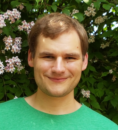Peter Deppisch

Research Interest
In the most places on earth the length of the light phase of a day (photoperiod) is not constant over the year. The amplitude of this variation depends on the latitude. At equatorial regions (low latitude) the daytime does not differ much from 12 hours the whole year. At high northern latitudes by contrast, in winter the photoperiod is very short, whereas in summer months it is very long. Animals that live in these regions have to adapt to these changing conditions. Indeed, some species of the subgenus Drosophila that have been collected in Finland, reveal differences in locomotor behavior and the expression of some crucial clock associated proteins compared to the model organism Drosophila melanogaster, a species of tropic origin. One of the affected proteins is CRYPTOCHROME (CRY), the circadian photoreceptor. In my work I primarily try to figure out the basic differences in the cry gene of high- and low-latitude species of the subgenus Drosophila and whether they are responsible for the observed differences. For this purpose I initially compare the cry promoter regions and genes of two equatorial species collected in Tanzania (D. mercatorum, D. hydei) and two species collected in Finland (D. ezoana, D. lummei). If this yields promising results, heterologous expression of Northern species’ cry genes shall confirm our suggestions.








